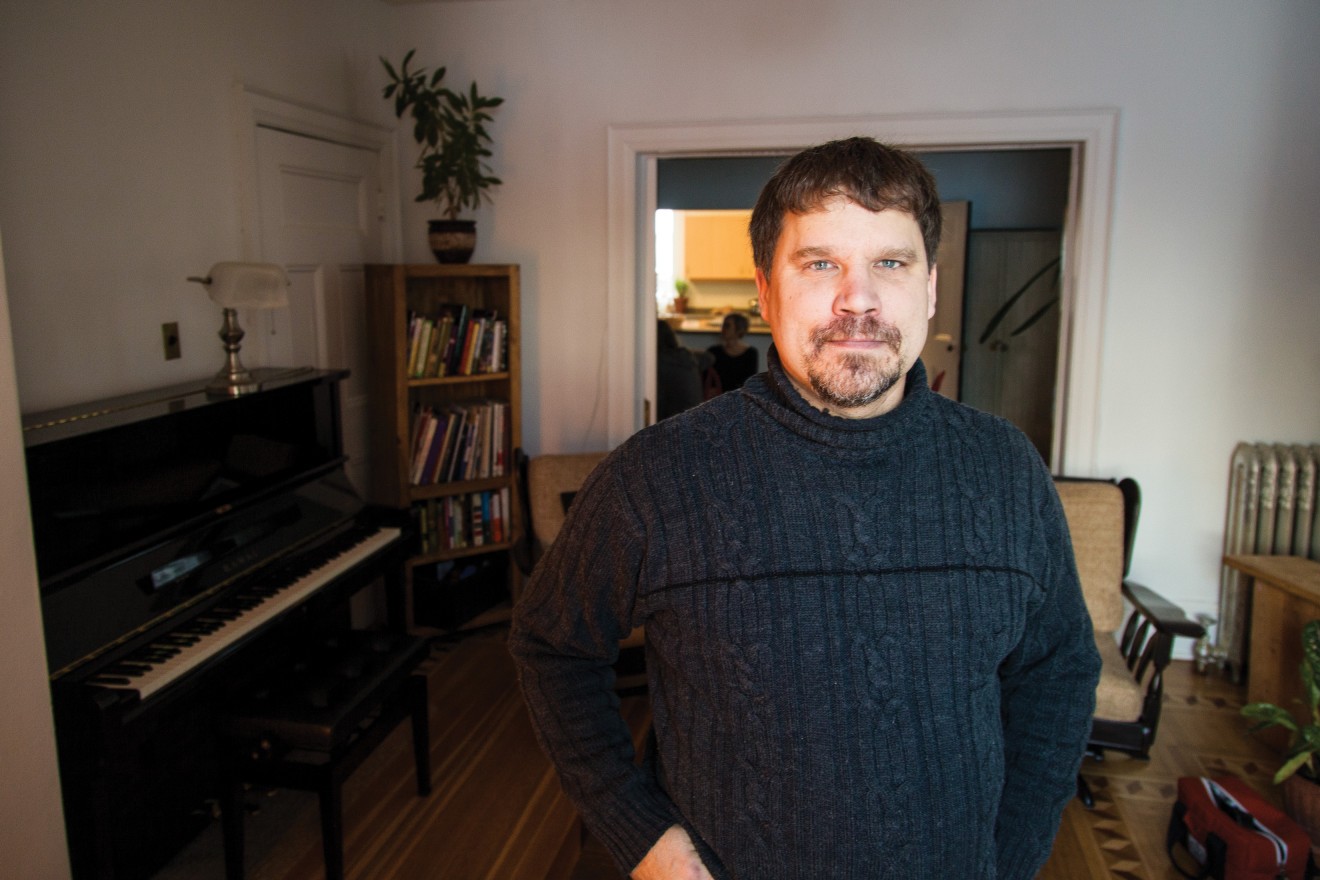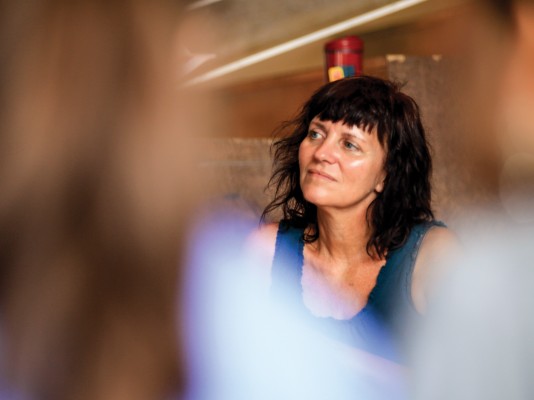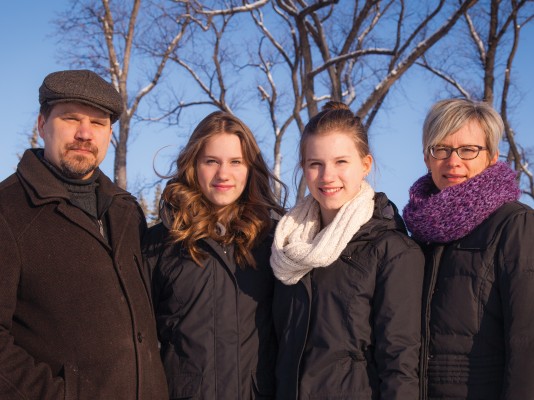
In 2001, Jarem Sawatsky headed from Virginia to his home in Winnipeg, Canada, with two key assets: a master’s degree in conflict transformation and the vision of a peacebuilding school similar to CJP’s Summer Peacebuilding Institute. Eight years later, after earning a PhD in law, Sawatsky saw his dream become a reality when he became the founding co-director of the Canadian School of Peacebuilding (CSOP) at Canadian Mennonite University (CMU).
When CSOP takes place in June 2015, it could very well be the school’s most successful year yet. Since Sawatsky helped start the school in 2009, it has grown steadily. Fifty people enrolled in CSOP in its inaugural year. In the summer of 2014, more than 200 students from around the world gathered on campus at CMU over two weeks for a selection of five-day courses.
CSOP courses cover various approaches to peacebuilding, justice, reconciliation, conflict resolution and development, and are taught by local, national and international peacebuilders.
Among the student body, you’re just as likely to find a 41-year-old church leader from Botswana as you are a 21-year-old CMU student from Brandon, Manitoba; the school aims to serve practitioners, professionals, activists, students, non-governmental organizations and faith-based groups alike.
Fifteen years ago at SPI, Sawatsky joined others in talking about the value of starting regional peacebuilding institutes all over the globe, which would cut down on the cost of travel for participants, as well as lower the ecological impact of travel on the environment.
This idea germinated in his mind for a half-dozen years, until Sawatsky was a faculty member at CMU and approached university administrators about developing CSOP. “Educating for peace and justice” is the first of four commitments CMU has outlined as central to its mission, so getting administration as well as the university’s other faculty on board was not difficult.
What makes the school uniquely Canadian, aside from its location in Winnipeg, is that key themes CSOP courses wrestle with include relations between settler and indigenous peoples, as well as care for the environment – topics at the forefront in Canadian society.
When developing courses, Sawatsky and Valerie Smith, CSOP’s co-director since the beginning, approached teachers and asked them: “If you could teach anything, what would it be?” If the answer to that question might be a course that meets people’s needs, Sawatsky said, “Let’s make it a reality.”
“We’ve tried to run courses that deeply serve the needs of peacebuilders, and bring in excellent faculty and treat them really nicely… so that it’s a work of hospitality and loving kindness and compassion and risk,” Sawatsky said. “(We) then engage the students in the same kind of manner.”
Living as if time is short
Sawatsky’s compassion developed at an early age. Born in February 1973 in Richmond, British Columbia (in western Canada), he is the second of two children born to Len and Donelle. His parents grew up in the Mennonite Brethren church. By the time Sawatsky and his brother, Andrew, came along, Sawatsky’s parents were “former hippies trying to build a Christian community lifestyle.”
Social justice and activism were important, and Sawatsky can recall travelling with his family to anti-nuclear protests in nearby Washington State. Sawatsky’s parents – particularly Len – were usually on the fringes of the church, and liked it that way.
When Sawatsky was 5, the family moved to Hamilton, Ontario, to start a house church as well as a magazine similar to Sojourners, a progressive Christian journal published in Washington D.C. Four years later, the family relocated to Winnipeg’s Wolseley neighborhood, where Sawatsky’s parents helped found Grain of Wheat, an ecumenical church community.
Sawatsky attended Gordon Bell High School, which he compares to the United Nations – most of his friends were from different cultures and faith traditions, something he cherished.
Sawatsky was an overachiever. When he graduated from Gordon Bell, he had earned enough credits to graduate twice. This trend continued in university. He earned his master’s degree in half the usual amount of time, and completed his PhD in two years, five years faster than most students.
As a teenager and undergraduate student, Sawatsky came to love the work of Jean Vanier and Henri Nouwen – academically gifted Roman Catholic writers who spent a significant amount of time befriending people with developmental disabilities.
Sawatsky has always been uncomfortable with the idea of striving for the kind of status typically accompanying his level of academic achievement. In Vanier and Nouwen, he found two kindred spirits.
“These two academics had incredibly sharp minds, but also knew sharp compassion was something totally different… and gave up the university to live in community with people with disabilities,” Sawatsky said. “I loved that. I loved the tragedy of it.”
While earning his undergraduate degree at Canadian Mennonite Bible College, one of CMU’s predecessor colleges, Sawatsky was able to put theological language to the practices he had been exposed to growing up in community. He was also able to further engage Vanier and Nouwen’s writing in his coursework.
Sawatsky takes comfort in Vanier and Nouwen’s work today, as his body and mind slowly degenerate as a result of having the gene for Huntington’s disease, an incurable neurological disorder.
In 2011, Sawatsky tested positive for Huntington’s. On the recommendation of his neurologist, he left his university position after the 2014 session of the peacebuilding school and went on long-term disability.
The diagnosis was not a complete surprise: Huntington’s is hereditary. His mother, grandmother and a few of his great-uncles had it, so Sawatsky knew he might some day develop it as well. Huntington’s causes progressively worsening physical and mental effects that, over the span of 10 to 30 years from diagnosis, become fatal.
“Everyone kind of thinks bad things won’t happen to them, but I always thought of it [developing Huntington’s] as a very real possibility,” Sawatsky said over cups of green tea at his Winnipeg home in November 2014. “I’m kind of grateful for that now.
“As a child, I looked at my hands and said, ‘There’s going to be a time when you can’t control any of this,’” he continued. “That leads to a different kind of awareness of how to enjoy life.”
Weeks together are best

Sawatsky calls his time at EMU a gift. As a student, he valued being able to learn from instructors who were not only academics, but who were out in the field, working as peacebuilders.
EMU provided Sawatsky not only with inspiration to create CSOP, but also equipped him with ways of teaching and being a peacebuilder. The stories he heard from both students and faculty are stories he tried to honor in his own research, teaching and practice as a peacebuilder.
“That’s been a very important gift to me that I’ve been grateful to have received,” he said.
With Sawatsky stepping down from his responsibilities, Wendy Kroeker, instructor in peace and conflict transformation studies at the university, has joined Val Smith as co-director of the CSOP.
Kroeker, also a SPI alumnus, says she hopes CSOP will one day run for three or four weeks each summer. This would allow students to get to know each other even better than they already do, and allow for more conversations outside of the classroom – something Kroeker witnessed at EMU that she thought was particularly meaningful.
“You go into one of the lounges at SPI and you have an Israeli and a Palestinian just going at it in terms of discussing issues in the Middle East,” Kroeker said.
Continuing to offer courses that engage Canadian issues such as applying restorative justice practices to indigenous/settler relations and colonial legacies are also part of the plan moving forward.
“We’re trying to choose courses that we as Canadians also need to struggle with,” Kroeker said. “We invite [people from other parts of the world] to be part of the conversation with us.”
One of Kroeker’s key pieces of advice for anyone interested in starting their own peacebuilding institute is to establish connections, and build relationships with, NGOs that can benefit from what is being offered. If an organization believes what you are doing is worthwhile, it will send its staff to take your courses. CSOP has been able to build relationships with NGOs both inside and outside Winnipeg.
“We have some participants from Winnipeg that have come every year,” Kroeker said. “This is now their place, their school, and they’re excited about what they’re learning.”
She adds that including a diverse set of voices is key to a successful peacebuilding institute. When the community helps influence what sorts of courses are offered and when teachers and participants learn from each other, that’s when possibilities for creativity and imagination happen.
“Those sparks don’t occur when you have a formulaic package, so be willing to invite a variety of voices,” Kroeker said. “Make sure you’re porous and you’re open.”
As a visiting instructor, Kroeker has worked at peacebuilding schools founded by CJP alumni elsewhere in the world, including the Mindanao Peacebuilding Institute in the Philippines and the Northeast Asia Regional Peacebuilding Institute, based in Seoul, South Korea.
Facing the darkness head on

What does post-CMU life look like for Sawatsky? He is still in the midst of figuring that out. Sawatsky has always done his best to maintain a work-life balance that allows him to be present and available to Rhona, his wife of 17 years, and Sara and Koila, the couple’s 13-year-old twins.
When Rhona, a teacher, and the girls returned to school this past fall, Sawatsky began spending time going on walks, writing poetry and cooking for the family. He has also been co-editing a book of essays by former CSOP instructors that is in its final stages.
He says his diagnosis in July 2014 was a relief because at that time, he had already been seeing symptoms in himself that made it difficult to keep working at CMU. He’s known for a while that this day might come.
“When I helped start the Canadian School of Peacebuilding, I never assumed I’d be around for a long time afterward,” he said. “I wanted to be able to let go while people still remembered something positive, rather than just be grateful that I’m gone.”
Huntington’s is a dark disease. It includes psychological elements similar to schizophrenia, memory issues akin to Alzheimer’s and movement problems more exaggerated than Parkinson’s.
Sawatsky and his family are facing the darkness head on. He and Rhona have been open with their daughters about what is going on, and they are free to ask any questions they have.
Sawatsky also finds comfort in laughing about the situation. While at a family gathering in his brother’s backyard this past summer, a tremor caused him to spill some of his drink on his lap just as his nieces approached.
“I thought, there’s nowhere to hide from this, so I looked [my brother] right in the eye and poured the whole thing on my crotch,” he said, chuckling at the memory. “Part of figuring out how to embrace the elephant in the room, for us anyway, has been trying to become friends with it. That includes some, I guess what others might call, dark humor. It’s become a good way of normalizing it.”
How to live with, and eventually die from, Huntington’s gracefully might be one of the biggest lessons Sawatsky and those who surround him teach and learn from each other.
“I find there’s kind of a freedom in letting go,” he said of his retirement. “The things that you think are important and part of what makes you, and who you are, all of a sudden don’t matter.”
“You can mourn that,” he added, “or you can embrace it and say, OK: How do I enjoy maybe an even more meaningful path?”